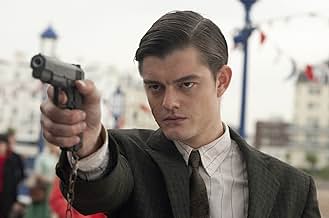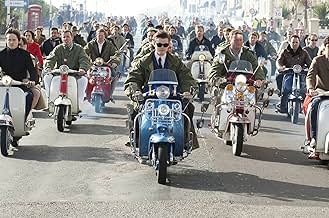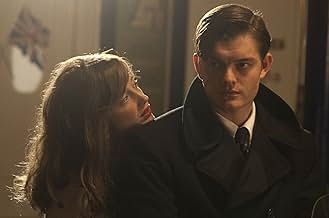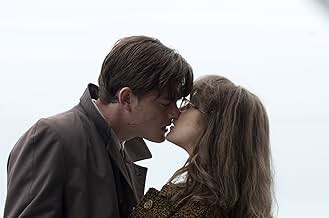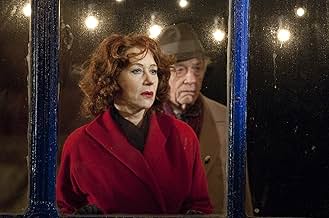IMDb RATING
5.7/10
6.9K
YOUR RATING
Charts the headlong fall of Pinkie, a razor-wielding disadvantaged teenager with a religious death wish.Charts the headlong fall of Pinkie, a razor-wielding disadvantaged teenager with a religious death wish.Charts the headlong fall of Pinkie, a razor-wielding disadvantaged teenager with a religious death wish.
- Awards
- 1 win & 8 nominations total
Phil Davis
- Spicer
- (as Philip Davis)
- Director
- Writers
- All cast & crew
- Production, box office & more at IMDbPro
Featured reviews
The main character of this movie is Pinkie Brown, a small-time thug in Brighton, England, in the 1960s. Pinkie's true evil nature comes out when he tries to take over a small gang of criminals after their leader had been killed by a rival gang. As played here, Pinkie is in his 20s and, as brash and amoral as he is, he and his mediocre cohorts are no match for the rival gang that basically runs underground crime in Brighton.
The action is sordid and ugly, but the glossy color photography works at cross purposes to conveying that mood. Much of the photography is more appropriate for an art film than for this down-and-dirty fare, making me think that maybe black and white would have been a more appropriate choice. As Pinkie, I found Sam Riley just a little too handsome for the part--he does not exude the menace and harsh personality that is Pinkie's nature.
I found the initial setup scenes rapid-paced and confusing, requiring close attention; if you don't follow what has happened early on, you will be at a loss to fully understand what happens later. An additional complication to my following the opening scenes was the fact that I am not a Brit and didn't always follow the cadences and clipped manner of speaking. I confess to starting the movie over after about fifteen minutes, with English subtitles turned on. That was a great help.
The score that often seems to aspire to the transcendent seems greatly out of place.
I wish I had seen this movie before having read the book, since having some of the images in mind would have been good. Never having been to Brighton, my mental picture of it would have been greatly enhanced by what is well captured here. While the movie strips from the book much of the depth of the themes of sexuality, morality, loyalty, and sin, there are things in the movie that I found improved upon the book. I liked Helen Mirren's portrayal of Ida as a more centered person than the blithe Ida of the book, and John Hurt fleshed out Ida's friend Phil better than what I got from the book. And there are a lot of little things. For example, I pictured the candy, Brighton rock, as being something like a candy cane rather than the weighty rod seen in the movie. I regret that Pinkie's lawyer Prewitt was deleted--he was a truly Dickensian character in the book. And why the great ending in the book was changed is beyond me.
The action is sordid and ugly, but the glossy color photography works at cross purposes to conveying that mood. Much of the photography is more appropriate for an art film than for this down-and-dirty fare, making me think that maybe black and white would have been a more appropriate choice. As Pinkie, I found Sam Riley just a little too handsome for the part--he does not exude the menace and harsh personality that is Pinkie's nature.
I found the initial setup scenes rapid-paced and confusing, requiring close attention; if you don't follow what has happened early on, you will be at a loss to fully understand what happens later. An additional complication to my following the opening scenes was the fact that I am not a Brit and didn't always follow the cadences and clipped manner of speaking. I confess to starting the movie over after about fifteen minutes, with English subtitles turned on. That was a great help.
The score that often seems to aspire to the transcendent seems greatly out of place.
I wish I had seen this movie before having read the book, since having some of the images in mind would have been good. Never having been to Brighton, my mental picture of it would have been greatly enhanced by what is well captured here. While the movie strips from the book much of the depth of the themes of sexuality, morality, loyalty, and sin, there are things in the movie that I found improved upon the book. I liked Helen Mirren's portrayal of Ida as a more centered person than the blithe Ida of the book, and John Hurt fleshed out Ida's friend Phil better than what I got from the book. And there are a lot of little things. For example, I pictured the candy, Brighton rock, as being something like a candy cane rather than the weighty rod seen in the movie. I regret that Pinkie's lawyer Prewitt was deleted--he was a truly Dickensian character in the book. And why the great ending in the book was changed is beyond me.
As a Brighton resident, I had to see this, but also probably spent more time looking at the locations (and more critically) than a normal viewer. On the plus side, there is excellent cinematography, and the film creates an atmospheric mid 60's version of Brighton that might be convincing to anyone too young to remember that time, but which contained too many jarring anachronisms for me. For example Rose lives in a tower block, which could have existed in 1964, and would have still been soulless and depressing, but would also have been practically brand spanking new, not run down and shabby with 20 years of neglect. This highlights another failing of the film, the clichéd exaggerated unrelenting squalor that all the criminals live in, which again is untrue to the period, twitching net curtains and keeping up (often threadbare) appearances was how things worked then, in working class neighbourhoods especially. You could create an oppressive atmosphere from these real elements (and the culture clash of the pre and post war worlds) perhaps more easily than from this invented total squalor.
So if the world the film creates is a Hollywood version of 1960's Brighton, do the characters engage you? Well I loved Helen Mirren and John Hurt, they brought a touch of class whenever they appeared, and Phil Davis is another very fine actor who is always watchable. Sadly the two main characters don't quite pull it off, and if I have to lay the blame it is chiefly with Sam Riley's Pinkie. If he could have alternated his cold unsmiling thuggishness with some charm, shown Rose a little tenderness some vulnerability even, that would have made her falling for him, and her naive notion that she could save him more convincing, and maybe made his cruelty and occasional physical violence toward her more shocking. Andrea Riseborough as Rose gives a fair performance, given that she does not have much to work with.
I'm sorry if this review makes the film sound worse than it is, because truth be told despite its failings it is consistently watchable, and still managed to engage me. An interesting failure.
So if the world the film creates is a Hollywood version of 1960's Brighton, do the characters engage you? Well I loved Helen Mirren and John Hurt, they brought a touch of class whenever they appeared, and Phil Davis is another very fine actor who is always watchable. Sadly the two main characters don't quite pull it off, and if I have to lay the blame it is chiefly with Sam Riley's Pinkie. If he could have alternated his cold unsmiling thuggishness with some charm, shown Rose a little tenderness some vulnerability even, that would have made her falling for him, and her naive notion that she could save him more convincing, and maybe made his cruelty and occasional physical violence toward her more shocking. Andrea Riseborough as Rose gives a fair performance, given that she does not have much to work with.
I'm sorry if this review makes the film sound worse than it is, because truth be told despite its failings it is consistently watchable, and still managed to engage me. An interesting failure.
I went to see this film with some trepidation. The original Graham Greene novel is very good and one of my favourites. The original film from 1947 was also extremely good, with Richard Attenborough as an unlikely but splendid villain. However this version was excellent. The fact that it had been updated to the 60s, which had worried me a little, worked well. Of course it did not have the period feel, but the aggression, violence and fighting for territory of the Mods and Rockers (which I remember well) echoed beautifully the behaviour of the gangsters and gave the opportunity for some very effective scenes visually. The acting I found completely plausible, with Phill Davies, John Hurt, Sam Riley and Andrea Riseborough all giving authentic portrayals. Helen Mirren, perhaps, looked a little too glamorous physically, but her acting was fine. Brighton itself was a wonderful additional character in all this. The contrast between the somewhat mindless hedonism of the holiday makers and the violent and ugly activities of the underworld was extremely effective and the use of the landscape beautiful and horrific in equal measure. The theme of sin, guilt and Catholicism was probably not dealt with as interestingly as in the novel, but that is a frequent limitation of the medium of film. Why on earth the makers of the film felt that they were entitled to "improve" on Graham Greene's ending I do not know. But it did not spoil my overall judgement that this was a very good film. I hope it will inspire those who have not already done so to read the novel.
BRIGHTON ROCK is a British remake of the 1947 brilliant film noir based on the novel by Graham Greene an adapted for the screen by Graham Greene and Terrance Rattigan. This BRIGHTON ROCK has been updated from the original 1930s setting to the 1960s and the screenplay is by Rowan Joffe (who also directs) - tough competition with the original writers! The result is a dark film that relies on performances by some actors who are not up to the task and makes them seem even more weak by the presence of such brilliant actors in smaller roles as Helen Mirren, John Hurt, Philip Davis and Andrea Riseborough.
The story takes place in 1964 in Brighton, once a quiet seaside town, is suddenly overrun by gangs of sharp suited Mods and greasy Rockers looking for a riot. Looking to be the top Mod gangster, Pinkie Brown (Sam Riley) will stop at nothing to be the biggest name in the crime world - bigger than the competitor Colleoni (Andy Serkis). Pinkie witnesses the vicious death of fellow Mod Kite (Goeff Bell) and is determined to kill the perpetrator Hale (Sean Harris). Pinkie's ruthless and violent ambition takes over his mission and when he discovers that a waitress named Rose (Andrea Riseborough) who works at Snows, a café run by Ida (Helen Mirren), is involved tangentially in the murders, Pinkie decides to court the plain Jane Rose, knowing that if he marries her she cannot testify against him should she discover Pinkie's guilt in the murders. Ida had a 'connection' with Hale and sees through the veils of deceit Pinkie is placing on the innocent Rose, and she and her longtime friend Phil (John Hurt) undermine Pinkie's plans. Pinkie marries Rose - a gesture that secures Rose's fascination and new love for Pinkie - to keep her from testifying against him. As factors around the conflicts between the two gangs tighten and Pinkie fears for his end, he convinces his new bride to take part in a mutual suicide, an act that has a surprising end.
What is missing in this updated adaptation is Graham Greene's important emphasis on the theme of sin, guilt and Catholicism: there are attempts to bring these concepts into the script but they become of lesser importance than the action and dark evocation of a period piece. There mood is well described by the cinematography of John Mathieson, but the single most effective aspect of this film is the brilliant music score by the gifted British composer Martin Phipps, godson of Benjamin Britten. Were there not an original film for comparison the film would likely be better accepted. But for those who are ardent fans of the novels of Graham Greene this film adaptation will likely disappoint. It is currently available On Demand and simultaneously in theaters before the DVD is released here.
Grady Harp
The story takes place in 1964 in Brighton, once a quiet seaside town, is suddenly overrun by gangs of sharp suited Mods and greasy Rockers looking for a riot. Looking to be the top Mod gangster, Pinkie Brown (Sam Riley) will stop at nothing to be the biggest name in the crime world - bigger than the competitor Colleoni (Andy Serkis). Pinkie witnesses the vicious death of fellow Mod Kite (Goeff Bell) and is determined to kill the perpetrator Hale (Sean Harris). Pinkie's ruthless and violent ambition takes over his mission and when he discovers that a waitress named Rose (Andrea Riseborough) who works at Snows, a café run by Ida (Helen Mirren), is involved tangentially in the murders, Pinkie decides to court the plain Jane Rose, knowing that if he marries her she cannot testify against him should she discover Pinkie's guilt in the murders. Ida had a 'connection' with Hale and sees through the veils of deceit Pinkie is placing on the innocent Rose, and she and her longtime friend Phil (John Hurt) undermine Pinkie's plans. Pinkie marries Rose - a gesture that secures Rose's fascination and new love for Pinkie - to keep her from testifying against him. As factors around the conflicts between the two gangs tighten and Pinkie fears for his end, he convinces his new bride to take part in a mutual suicide, an act that has a surprising end.
What is missing in this updated adaptation is Graham Greene's important emphasis on the theme of sin, guilt and Catholicism: there are attempts to bring these concepts into the script but they become of lesser importance than the action and dark evocation of a period piece. There mood is well described by the cinematography of John Mathieson, but the single most effective aspect of this film is the brilliant music score by the gifted British composer Martin Phipps, godson of Benjamin Britten. Were there not an original film for comparison the film would likely be better accepted. But for those who are ardent fans of the novels of Graham Greene this film adaptation will likely disappoint. It is currently available On Demand and simultaneously in theaters before the DVD is released here.
Grady Harp
A really big step in the career of Richard Attenborough came when he starred in the first film of Graham Greene's novel Brighton Rock. It was so good you'd think no one would try and top it, but in 2010 the story was filmed again and the time of the story updated from post war Great Britain to the swinging sixties and the riots between the Mod and Rocker teens. That is the background for young Sam Riley to try and take a really big step in the rackets.
Which are pretty much the same as they are here although it is rare that guns are used as per the culture. Sam Riley in the lead role that helped give a boost to Richard Attenborough's career is an amoral young man who gets involved in a homicide. A revenge killing really, but a young woman who works in Helen Mirren's store can finger him for the crime.
What to do but woo Andrea Riseborough and marry her so she can't testify against him. But when Riley's crew leans on Mirren's friend John Hurt at his place of business and the guy that Riley killed was Mirren's boyfriend she'll do what it takes to take Riley down.
Some nice shots of Brighton which is like Atlantic City here, a rather run down resort area, or at least Atlantic City was before the casinos arrived. Riley, Riseborough, Mirren, and Hurt do quite well by their roles.
There is a really nice performance by Andy Serkis as a rather flamboyant gay gangster who is head of the other mob. He checks out Riley like a slab of beef on the rack at the butcher shop, but he doesn't let his lust get in the way of squelching a rival.
There's also a little more of the Catholicism of Graham Greene in the plot than there was in the first film. Even as amoral a young man as Riley does get guilt tripped quite a bit for the advantage he takes of Riseborough.
Not a bad film, but not up to what Richard Attenborough starred in.
Which are pretty much the same as they are here although it is rare that guns are used as per the culture. Sam Riley in the lead role that helped give a boost to Richard Attenborough's career is an amoral young man who gets involved in a homicide. A revenge killing really, but a young woman who works in Helen Mirren's store can finger him for the crime.
What to do but woo Andrea Riseborough and marry her so she can't testify against him. But when Riley's crew leans on Mirren's friend John Hurt at his place of business and the guy that Riley killed was Mirren's boyfriend she'll do what it takes to take Riley down.
Some nice shots of Brighton which is like Atlantic City here, a rather run down resort area, or at least Atlantic City was before the casinos arrived. Riley, Riseborough, Mirren, and Hurt do quite well by their roles.
There is a really nice performance by Andy Serkis as a rather flamboyant gay gangster who is head of the other mob. He checks out Riley like a slab of beef on the rack at the butcher shop, but he doesn't let his lust get in the way of squelching a rival.
There's also a little more of the Catholicism of Graham Greene in the plot than there was in the first film. Even as amoral a young man as Riley does get guilt tripped quite a bit for the advantage he takes of Riseborough.
Not a bad film, but not up to what Richard Attenborough starred in.
Did you know
- TriviaPhil Davis (Frank Spicer) previously played the mod Chalky in Quadrophenia (1979), which was likewise set in Brighton in 1964.
- GoofsWhen Rose opens the record player, it has a modern British plug on it. In 1960s Britain plug pins were round. Safety switches wall sockets would not have been in place at this time, either.
- ConnectionsFeatured in Breakfast: Episode dated 28 January 2011 (2011)
- How long is Brighton Rock?Powered by Alexa
Details
- Release date
- Countries of origin
- Official site
- Language
- Also known as
- Băng Đảng Brighton
- Filming locations
- Production companies
- See more company credits at IMDbPro
Box office
- Budget
- $12,000,000 (estimated)
- Gross US & Canada
- $229,653
- Opening weekend US & Canada
- $32,774
- Aug 28, 2011
- Gross worldwide
- $2,913,599
- Runtime
- 1h 51m(111 min)
- Color
- Sound mix
- Aspect ratio
- 2.39 : 1
Contribute to this page
Suggest an edit or add missing content





